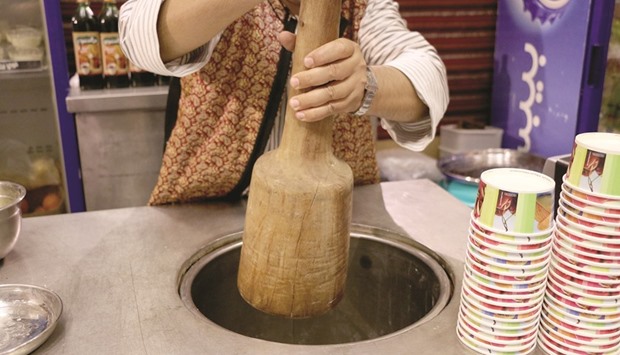Facing and living the war head-on, he is taking every single opportunity of making whatever money he can. Hard cash is the most sought after commodity in his country now. It is the only thing people need the most there, but do not get it.
Ahmed (Not his real name) from Damascus, Syria is working as a shopkeeper at one of his friends stalls here in the Eidiah Tourist Festival underway at the Qatar National Convention Centre (QNCC).
He used to have a bigger and better shop than this back home. It was destroyed in the war along with his house. He now sells whatever small-time goods he can by going around in the streets. But there is no money.
“Before the war, our life was very good in Damascus. War has changed everything. Life is broken now. Everything is broken. I used to have a very good business in a market in Damascus but that entire marketplace is gone now along with my shop in it,” Ahmed tells Community. He does not want to give his real name.
“And such is the situation in entire of Syria, not just Damascus. Life there is very difficult now. I owned a big shop and was doing very well before it was bombed. Now, I do not have resources to build a shop and I am just going around by foot selling whatever I can,” he says.
The monthly income from these sales is so meagre that it is does not last a week. Moreover, people (consumers) have no money to buy things. The goods are just that expensive, even the things of everyday use are beyond the reach of common man.
His entire family is in Syria, says Ahmed. He used to have his own house where he was living with his wife and children but now that house is also gone. It was destroyed in the war. And, Ahmed had to move to his parents’ house to live with them now.
“We are all living in one small house now. But then, we are not alone. Millions of others are living in the same conditions in Damascus and in other cities of the country. People just have no money, nothing,” says Ahmed.
There may be a very small number of people who have some savings or money left with them, may just over 100,000 in the entire country. But the remaining 20 million people have no money, he adds.
“I am selling small things to make whatever money I can. God helps us. Whenever, we are in trouble, God is there for us. He will make things okay again,” says the salesman.
He has four children, and his youngest one is 12 years old. They still go to school as it is still affordable, he says, and he wants them to get education.
People have left Damascus and Syria in large numbers but now he says most people do not even have money to pay to the human smugglers who could get them to Europe or any other country.
“We have no money, no cars, therefore no means of transportation. How would we get out of there? There simply are no means available,” says Ahmed.
His immediate family, he says, is safe so far. But he is worried about their future. He has been trying to relocate to some Middle Eastern country with his family but so far without success. The best option, he believes, was to go to Germany, which has received a big chunk of the Syrian refugees.
But Ahmed says Germany too is now closed for them. “They allowed a fixed number of people and then they closed it. Had it been open, I would have tried to go there directly because I have heard living is very good there,” he says.
Ahmed says he has heard that in Germany, the living expenses are taken care of, education for your children is free and you have opportunities to make money for yourself. “In my country right now, even if you work 24 hours a day, it is still not enough to buy food for the family,” he says.
“None of my family, or my tribe of more than thousand people, have been able to leave the warn-torn country. Some were hit directly by the war and died, some went missing and some moved to other safer places within the country.”
This is his second time coming to Doha. He is manning his friend’s stall and will be paid wages for his work. He will stay here for the entire festival till July 30, before returning to his family in Syria with whatever savings he accumulates from his work at the shop.
Business at the festival has been good, Ahmed says. The most moving items in the shop have been Arabian ice cream, Arabian coffee and juices.
His English is good enough to communicate with the customers who do not speak Arabic. Ahmed says he learnt the language from some of his friends back in Syria and from the tourists who used to frequent his city a few years ago before the war.
But, now there is nothing left. Ahmed, however, is hopeful that the war will stop soon. “Everybody has taken what they wanted. All sides have gotten what they wanted from this conflict so I hope the war will soon come to an end.”

STRUGGLE: Ahmed says he used to have his own business back in Syria, but is now forced to do small time jobs to make money. Photo by Umer Nangiana
